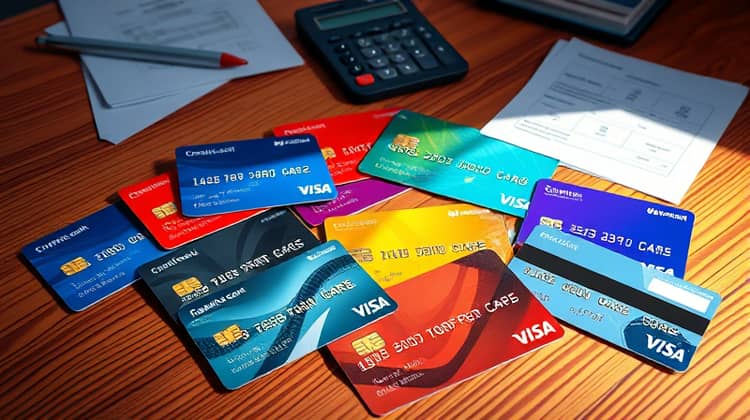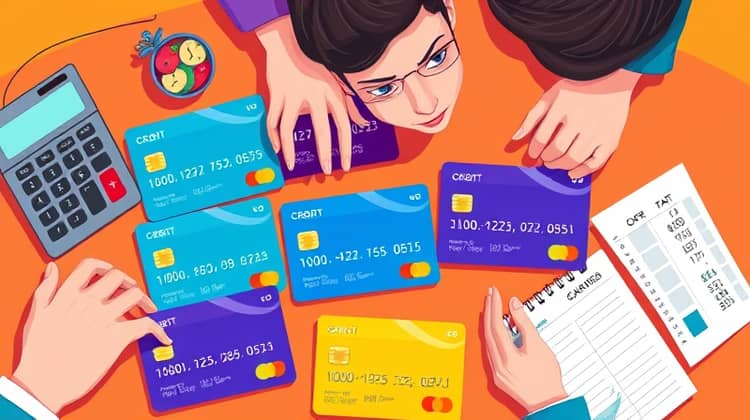In today's fast-paced financial environment, choosing the right credit card can have a significant impact on your financial health. With so many options available, it's crucial to understand what differentiates each card and how they can align with your unique financial habits. This guide will provide you with the necessary steps to identify and select the best credit card that suits your needs.
Credit cards offer a variety of features and benefits, from cashback rewards to travel miles, making them an attractive option for many consumers. However, without a clear understanding of how to navigate this landscape, one can easily fall into the trap of overspending or incurring high-interest debt. Let's dive into the essentials of choosing the right credit card for your financial journey.
Understanding Credit Cards

Credit cards are financial tools that enable consumers to make purchases by borrowing funds from a pre-established limit. They are widely accepted and can be an excellent way to build credit history if used responsibly. However, it's essential to understand the terms associated with credit cards, including interest rates, fees, and rewards, to make informed decisions.
Many people rely on credit cards for convenience and emergencies, but they can also lead to debt if not managed properly. Familiarizing yourself with how credit cards work can help you maximize their benefits and avoid common pitfalls. Here, we will outline some important aspects to consider when choosing a credit card.
- Types of credit cards available
- Benefits and pitfalls of using credit cards
- Understanding credit card terms and conditions
By grasping the fundamentals of credit cards, you can approach the selection process with a clearer perspective. Now, let’s break down the steps to consider when choosing a credit card that aligns with your personal financial goals.
1. Assess Your Needs and Spending Habits

Before applying for a credit card, it's vital to evaluate your financial circumstances, spending patterns, and overall needs. Are you looking for a card for everyday purchases, travel rewards, or perhaps building your credit score? Understanding your primary purpose will help you identify which type of card aligns with your expectations.
Consider how frequently you use credit cards for shopping, dining, or online purchases. Also, track how much you typically pay off each month to help inform your decision. The more precise you are in assessing your needs, the more likely you are to choose the ideal card for your situation.
Lastly, think about your future financial goals. Do you plan to travel frequently or make significant purchases in the near future? These factors will play a critical role in determining the best card for you.
- Frequency of credit card usage
- Types of purchases made
- Expected rewards or benefits
Understanding your spending habits is essential as it influences the type of credit card options available to you. Armed with clarity on your needs, let’s move on to the next step - checking your credit score.
2. Check Your Credit Score

Your credit score plays a significant role in determining which credit cards you qualify for and what interest rates you will be offered. Lenders use this score to assess your creditworthiness, reflecting how well you manage debt. Before applying for a new card, it's wise to know where you stand financially.
You can request a free credit report from the major credit bureaus, which will allow you to review your score and understand any potential inaccuracies that could hinder your application. Monitoring your credit score regularly can also help you to build a healthier financial status overall.
3. Research Different Types of Credit Cards

Now that you have evaluated your needs and know your credit score, it’s time to dive into researching the different types of credit cards available in the market. Each type serves unique purposes, which can cater to various spending strategies. Understanding these can guide you toward making a well-informed decision.
Common credit card types include standard cards, rewards cards, travel cards, and balance transfer cards. Each one comes with its own set of advantages and disadvantages, making it essential to focus on what best fits your financial activity. Here are the main categories you should consider:
- Standard Credit Cards: Basic options with no rewards.
- Rewards Credit Cards: Earn points, miles, or cashback on purchases.
- Travel Credit Cards: Benefit from travel-related perks and exclusive offers.
- Balance Transfer Cards: Designed to help consolidate debt at lower rates.
Having an understanding of the various credit card types will streamline your selection process. Once you’ve narrowed down your choices, the next step is to compare interest rates and fees.
4. Compare Interest Rates and Fees

Different credit cards come with various interest rates and fees, which can have a significant impact on your overall cost of using credit. It's important to look beyond the promotional rates and understand what you will likely pay if you carry a balance beyond the grace period. Start by comparing Annual Percentage Rates (APRs) across potential cards, as this will influence how much credit will cost you over time.
In addition to interest rates, you should also consider fees, including annual fees, late payment charges, foreign transaction fees, and any other hidden costs that may apply. Often, a card with no annual fee can save you money, especially if you don’t intend to use the card often. Don't underestimate the importance of these costs in your decision-making process.
5. Consider Rewards and Benefits

Many credit cards offer various rewards and benefits to entice consumers, making it an enticing aspect of choosing a card. These rewards can come in different forms, including cashback, points, travel deals, and more, allowing you to gain more from your spending.
However, it’s essential to carefully evaluate these benefits in connection to your spending habits to ensure you can truly take advantage of them. Here’s a list of the most common rewards and benefits offered by credit cards:
- Cashback rewards for purchases
- Travel points or miles for flights or hotels
- Bonus rewards for signing up or spending a certain amount
- Discounts at selected retailers or services
Understanding these rewards will help you select a card that maximizes your potential savings and benefits. Next, let's move on to the importance of reading the fine print when it comes to credit cards.
6. Read the Fine Print

Many credit card users overlook the fine print, which often contains crucial details that can affect your usage. Terms and conditions can encompass a wide variety of factors, including penalties for late payments, the specifics of how rewards are earned and redeemed, and other restrictions that may not be immediately apparent at first glance.
Before finalizing your choice, take time to read through the terms thoroughly, asking questions if needed. Being fully informed about what the card entails will help avoid unpleasant surprises later on.
7. Apply for the Card

Once you have conducted your research and found a credit card that aligns with your financial needs, it is time to apply for the card. Many credit cards now have an online application process, which allows for convenience and quicker responses to your application.
Ensure that you provide all required documentation accurately to improve your chances of approval. After submitting your application, monitor your credit score to see how the inquiry might affect future credit opportunities.
Tips for Responsible Credit Card Use

Possessing a credit card comes with the responsibility of using it wisely. To get the best out of your credit card, you should prioritize responsible practices that will keep your finances in check and protect your credit score.
Here are some guidelines for maintaining a healthy credit usage:
- Pay your balance in full each month to avoid interest.
- Stay within your credit limit to prevent fees.
- Use credit cards for planned expenses rather than impulse purchases.
Implementing these tips will help you utilize your credit card effectively while safeguarding your financial future. Remember, the goal of credit cards is to provide you with flexibility and rewards, not to increase your financial burden. By choosing wisely and managing your credit responsibly, you can enjoy the benefits they offer without the pitfalls.














